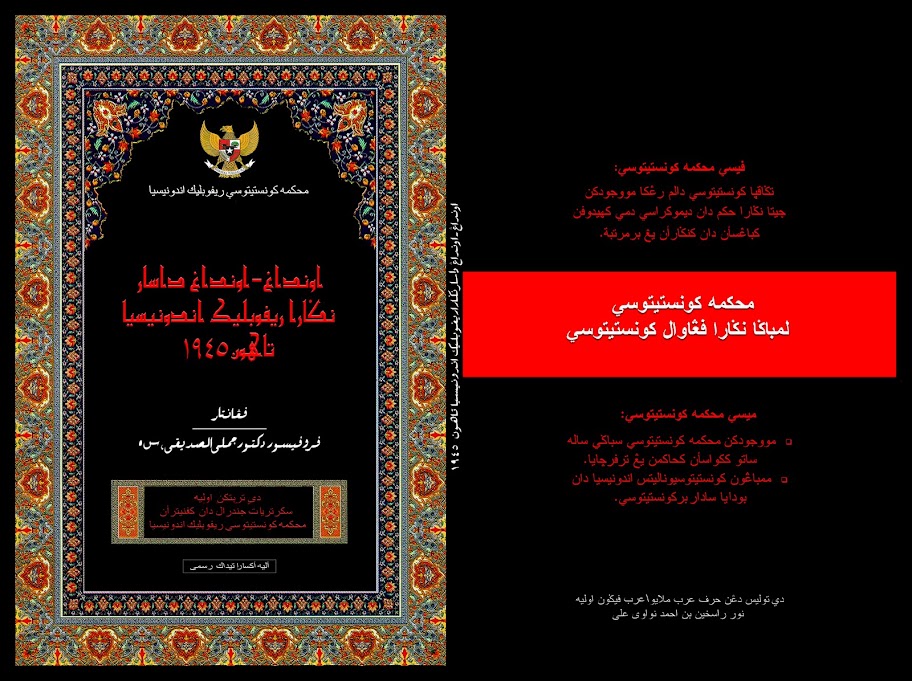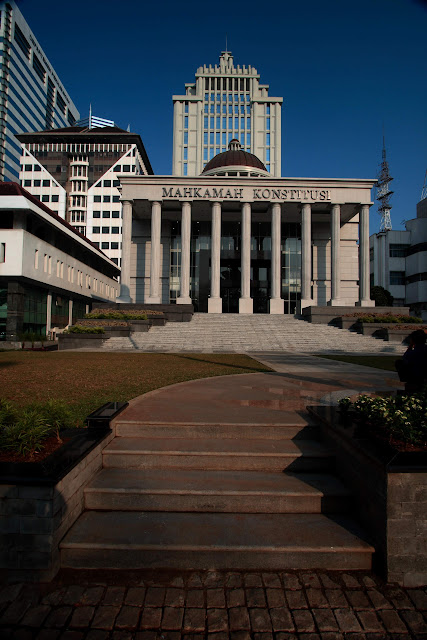 |
| Principal Petitioner, Anthon Melkianus Natun as Vice Chairman of the Parliament in Kupang district on reviewing Act No. 27/2009 on MPR, DPR, DPD and DPRD [Article 354 paragraph (2)]. In its verdict the court rejected the petition in its entirety because the petition is groundless arguments according to law, on Thursday (28 / 7) |
|
Petition filed by the Vice Chairman of Regency Kupang Melkianus Natun Anthon stated rejected for entirely by the Constitutional Court (MK). The reading of the verdict was read by the Chairman of the Constitutional Court, Moh. Mahfud MD, assisted by eight judges constitution on Thursday (28 / 7), at the Plenary Court Room.
“Declare the Provisions, rejected the request provisional petition. In the Basic Petition, Rejecting the petition in its entirety, “said Mahfud when reading Decision No. 21/PUU-IX/2011 read it.
In the main petition, Petitioner argues that Article 354 paragraph (2) of Law 27/2009 are multiple interpretations that conflict with the principle of legal certainty and non-retroactive principle (prohibition of retroactive effect) and does not meet the principles of the formation of legislation. Court’s opinion read by Judge Ahmad Fadlil Sumadi states that Article 354 paragraph (2) of Act 27/2009 which stipulates that Parliament leaders from political parties in order of acquisition of seats in the regency / city, according to the Court’s intention is clear and light, can not be interpreted other.
“The Court considered that the provision did not violate the principle of legal certainty of fair and equal treatment before the law for the leadership of Parliament who has been designated as a leader who later due to the creation of the aspirations of the people are sovereign, should end his tenure as leader because of the order of seats of political parties being reduced. Legal certainty of the rules lies precisely on the proviso that if the sequence number of seats changed political party in connection with the regional division of the sovereign people’s aspirations, then the composition of the leadership positions should also change, “explained Fadlil.
The provisions of Article 354 paragraph (2) of Law 27/2009 is precisely in accordance with fair legal certainty, as well as equal treatment before the law. A quo provision, continued Fadlil mentioned that political parties before the regional division chair the order of acquisition is less than any other political party but then because of the acquisition sequence of area chair be more entitled to occupy leadership positions Parliament. ”Political parties are the order of acquisition Instead chair to be reduced and no longer had ranks the highest number of seats should be removed from office the leadership of Parliament. It is also consistent with the provisions of Article 28D paragraph (3) of the 1945 Constitution which gives every citizen equal opportunity in government, “he explained.
Meanwhile, the Petitioners’ argument that Article 354 paragraph (2) of Law 27/2009 is contradictory to Article 28I paragraph (1) of the 1945 Constitution which is a human right that can not be reduced under any circumstances, especially the right not to be prosecuted on the basis of applicable law subsided. According to the Court as expressed by Muhammad Alim, in the case of dismissal of the previous parliament leader because of majority of seats for regional expansion, the meaning of the words “not prosecuted on the basis of a retroactive law” is an absolute force in the field of criminal law because it contrary to the principle of legality. ”As for the relationship with the petition, the dismissal from office, not prosecuted on the basis of a retroactive law, but by changing the order of seats Political Parties petition because of the displacement seat parliament seats Political Parties Political Parties petition so that the applicant no longer occupies the highest order,” said Alim.
Alim added all the members of parliament, representing the voters who elected them. If the voters are sovereign is no longer included in the parent region, but has been included in the expansion area, then the legislators who remained in the area of the parent is not representing the voters who have included the expansion area. ”Thus, each regional division, and there is no transfer of Parliament seats to the area expansion would change the configuration of the sovereign voters to support a particular political party. Based on all the legal considerations described above, the Court believes the petition is groundless arguments according to law, “said Alim.
In such decisions, there are three constitutional judges who have a different opinion (dissenting opinion), namely the Constitutional Court Justice Maria Farida Indrati, Hamdan Zoelva, and Anwar Usman. All three claimed the Court should grant the petition to declare Article 354 paragraph (2) of Act No. 27/2009 was conditionally unconstitutional, which is unconstitutional to the extent not interpreted: “the composition of the leadership of parliament did not change despite a change in the composition of the number of seats each political party may result in the expansion area legislators from districts / cities which occurs after the determination of the leadership of regency / city carrier based on the results of the elections “. Of the various provisions, the legal guarantee of DPRD leadership tenure is five years and there is no mechanism to let him go in the middle of the term of office except under the provisions of Article 42 of Regulation 16/2010.
Therefore, the reasons used to replace one of the leadership position Regency Kupang which is held by the applicant by reason of the number of seats was reduced HANURA Party after the transfer of some members of the local parliament of Sabu Raijua district legislators may result in the division is not fair to the applicant because it violates provisions of the reasons for the dismissal of parliament leaders in the middle term.
Hamdan expressed none of the legal mechanisms provided for in legislation to dismiss the head of parliament due to changes in the composition of the number of seats due to regional expansion, so the law must provide a guarantee for someone who has been appointed head of Parliament for a term of five years and can not be dismissed in term of office for no reason that it is set clearly. Mechanisms determine the leadership of Parliament is not a constitutional issue, but legal policy and political issues of law forming the Act.
“That is, whether the head of Parliament is determined based on the ratings of the seat of political parties or the rank number of seats in Parliament or election by the parliament just a way and purely political choice and not a constitutional issue. Therefore, in this case legal policy issues must not sacrifice the constitutional rights of citizens to obtain a fair legal certainty is guaranteed by the constitution in this case the right of a person who has been promoted to senior leadership positions during the five-year parliament that has been guaranteed by the laws that already exist previously. Therefore, to prevent violations of the principle of a fair legal certainty guaranteed by the constitution, then the interpretation of Article 354 paragraph (2) of Law 27/2009 is to be limited and affirmed by the Court, “Hamdan explained. (Lulu Anjarsari/mh/Yazid.tr)







